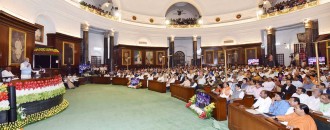
The 2009 GST framework had only two rates, 5% & 14%, Asim Dasgupta
By Sheela Mamidenna As the Chairman of the Empowered Group of State Finance Ministers which was instrumental in the formulation of GST Laws in 2009, Dr Asim Kumar Dasgupta can be rightly called as the ‘architect of GST’. A reformer by heart he set out to mastermind the most ambitious tax reform in Indian history by introducing the Value Added Tax (VAT). He was the man who was instrumental in doing away with many draconian tax levies such as octroi and highway toll in West Bengal and was fondly referred to as ‘my US-trained finance minister’ by the then Chief Minister of West Bengal, Jyoti Basu. Dr Dasgupta, an MIT graduate continues to inspire the new generation as he lectures at various ...
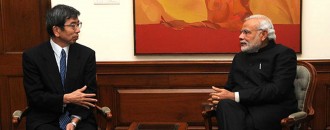
ADB President Nakao warns of multiplicity of tax rates in GST
The Dollar Business Bureau Terming the rollout of GST as an important achievement, Asian Development Bank President, Takehiko Nakao, who was on a 3-day visit to India termed the roll-out of the GST as an important achievement for this government. But added that this achievement is not without its flaws. He was appreciative of the government’s determination to push forward with reforms, but wanted the government to put more energy into ‘labour’, ‘land acquisition laws’ and FDI so that Indian economy can grow faster than that of China’s. Speaking to the media about his views on the rollout of the GST he said, ‘it is difficult to gauge the impact of GST on the economy until it is implemented but the best thing ...
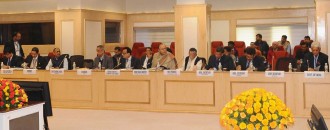
Breakthrough by the GST Council and challenges ahead
Ranjeet Mahtani & Stella Joseph This week saw the GST Council make great strides in gathering consensus on unresolved issues. Three key decisions emerging from the meeting held on January 16, 2017 were as under: Consensus was achieved on the aspect of dual control between the Centre and the States. It was also agreed that States would have the power to tax activities carried out within 12 nautical miles. It was felt by the GST Council that July 1, 2017 seems to be the likely date when GST will be implemented in the country. As regards the aspect of dual control, it was decided that for assessees with an annual threshold of Rs. 1.5 crores or less, the States would have power to administer i.e. power ...
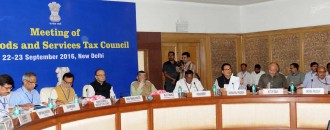
GST: Centre, states agree on timetable for April 1 roll out
PTI Moving towards rolling out GST from April 1, Centre and states today agreed on a timetable for deciding on the tax rate and completion of legislative work but differences remained on the turnover limit for exemption from the new tax. The first meeting of the newly constituted GST Council saw states like Tamil Nadu and Uttar Pradesh demanding a larger say than one-state-one-vote principle that puts a smaller state on equal footing with a large manufacturing one. While their demand was overruled, consensus also eluded first day of the meeting over the issue of exemption to dealers from the Goods and Services Tax (GST). While some states demanded traders with turnover of Rs 10 lakh or less be exempted, a ...
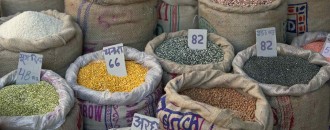
Govt to release unmilled dal to curb price rise
PTI With retail prices of pulses surging to near Rs.200 per kg level, the Centre is releasing 10,000 tonnes of tur and urad pulses to the states for distribution to common man at rates not exceeding Rs 120/kg. The government has decided to release "10,000 tonnes of unmilled Tur dal at Rs.66 per kg and unmilled urad dal at Rs.82 per kg to the states for retail distribution" of milled/processed dals at not more than Rs.120 per kg, an official statement said today. States have been requested to immediately place their requirement for making allotment of tur and urad dals for retail distribution through their channels, it said. The Centre has built a buffer of 50,000 tonnes by way of domestic procurement. Additionally, about ...

'Regulatory burden from States affecting India's business environment'
The Dollar Business Bureau Tough regulatory measures make India a difficult place to do business and the country needs concerted action on several fronts to improve business environment, said Onno Ruhl, Country Director, World Bank. “A disproportionately high regulatory burden is borne by businesses in India today. This difficult regulatory burden is exemplified by India’s current rank of 142 among 189 nations in the World Bank’s Doing Business 2015 study. “The stark reality is that India remains a difficult place to do business,” said the World Bank Director in his foreward to a study titled ‘Assessment of State Implementation of Business Reforms’. According to the study released on Monday, India does not feature among the top 100 countries on 8 of ...

Bloomberg Philanthropies to help India in Smart City project
The Dollar Business Bureau Bloomberg Philanthropies has become the official knowledge partner of the Indian government’s smart city project and the organisation will soon start preparing list of possible cities. The ministry of urban development has accepted the offer of Bloomberg Philanthropies (BP) for cooperation in conducting the ‘Cities Challenge’ competition for selecting the cities for financing. Bloomberg Philanthropies will act as the knowledge partner for the smart cities mission, a government state said. BP will assist the ministry in design and implementation of the selection process. It will also help the government in designing and delivery of a capacity development programme for urban local bodies of aspiring cities. The organisation will also help the government in formulating ...
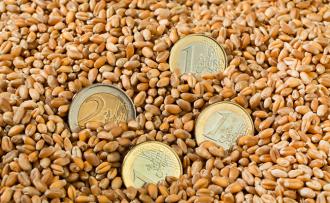
Centres support through subsidies for farmers not to benefit banks
The Dollar Business Bureau Governmental support through subsidies may not significantly benefit banks as the amount of support (Rs. 2,500/acre) to be provided is marginal compared with the extent of the losses (Rs 20,000/acre). Also, it is unlikely that the support money will be used by impacted farmers to repay bank loans, said a rating agency report. The government has announced 10% of State Disaster Relief Fund to be contributed to farmers for natural calamities, which translates into about Rs 2,500/acre. The government is also contemplating a loan restructuring or interest subvention effort for affected farmers, aimed at providing relief to the farmers’ debt obligation. While this may reduce the NPL (non-performing loan) classification of these loans, we expect the loan ...


